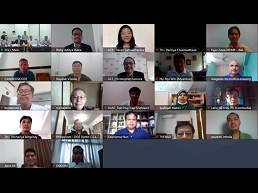
Holding of an online seminar in the FY2021 energy conservation support project for ASEAN countries on Oct. 2021
<Meeting>
The Energy Conservation Center, Japan (ECCJ) held a seminar in an online format on October 6, 2021 to start activities in the FY2021 ASEAN-Japan Energy Efficiency Partnership (AJEEP) Scheme 2 (training of trainers (TOT) program for developing the qualified energy managers).
The main topics of the seminar were as follows.
(1) Explanations of a general overview of the AJEEP, the Scheme 2 objectives/annual activity plans, and the energy audit methods
(2) Introductions to excellent case examples of energy audit reports (from Brunei and Myanmar)
(3) Confirmation of the participants from each ASEAN country and the methods for conducting the energy audits with
 |
| Situation while holding the online seminar |
As the first part of the Scheme 2 program in the FY2021 EE&C capacity building project for ASEAN countries, an online seminar was held with the participation of a total of 28 persons. These consisted of 26 persons from each of the ASEAN countries and from the ASEAN Centre of Energy (ACE), together with two presenters from Brunei and Myanmar who introduced excellent case examples of energy audits.
(1) ECCJ gave the current fiscal year’s participants a general overview of the AJEEP, and explained the details and schedule of the Scheme 2 (training of trainers (TOT) program for developing the qualified energy managers) and the methods for conducting energy audits in the participants’ own countries.
(2) As excellent case examples of energy audits conducted in the past, two persons from Brunei and Myanmar who had previously completed training gave explanations including the key points when conducting energy audits and points to consider when creating audit reports. This proved to be an extremely useful opportunity for the current fiscal year’s participants.
(3) For countries where the impacts of the COVID-19 pandemic made it impossible to actually implement energy audits in factories and buildings, necessary data was extracted from the results of energy audits which had been conducted previously. A virtual audit method for conducting audits based on this data was proposed, and agreement was reached from each country.
Even though the current fiscal year corresponds to the final year of this program, a start was made with two times more participants than in an average year. Taking the opportunity of the seminar held this time, all the participants intend to take part in the courses which will conduct activities including energy audits and reports preparation, practical training utilizing the Thai Training Centre, intermediate audit guidance, an online presentation of audit reports, and technical training courses related to heat and electricity in an aim to receive AJEEP ASEAN trainer certification.
* AJEEP: ASEAN-JAPAN Energy Efficiency Partnership
Program for building EE&C capacity in the ASEAN region by dispatching experts and implementing training in Japan

